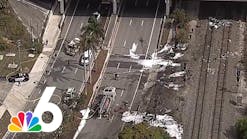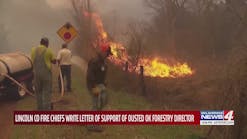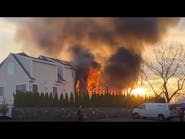Labor Rules Complicate W.Va. Fire Station Rebuild
Source Charleston Daily Mail (West Virginia)
Nearly a month after being dealt a setback by state lawmakers, officials in the Sissonville Volunteer Fire Department said they are scratching their heads over labor rules they must follow in the rebuilding of their main fire station.
Late in the Legislature's recent session, House leadership pulled a bill from the agenda that would have exempted state volunteer fire departments from prevailing wage and labor rules that other public authorities must follow for expansion projects.
"It's the ultimate irony that a volunteer department is compelled to pay prevailing wage," said Tom Miller, a volunteer firefighter and secretary of the department's board of directors.
"I've worked for 27, almost 28 years for my community for free, and now I'm having to pay prevailing wage to build a building," he said.
"I'm not anti-union, but it just boggles me."
Miller said if the bill had passed, it likely would have saved the department about $645,000 in construction costs to rebuild the station, which burned to the ground in October 2010.
Labor groups lobbied against the plan, saying fire departments should abide by the same laws as everyone else.
The bill's failure meant the department had to go back to the drawing board and bring in some help to figure out a way to bring costs down.
"We put out a bid for a project manager, and we're in the process of finalizing that right now," Miller said.
The department was interviewing the final candidates this week. He hopes a decision will be made next week.
"As soon as we have a project manager in place, we're going to actively work on breaking ground and moving forward on the project," he said.
The project manager will work until construction is complete, coordinating with contractors and subcontractors. He or she also will negotiate reductions in some building costs.
That will include contacting some firms that offered to donate materials.
"Pretty much we have to work out the materials prices since labor is set for us," Miller said.
He said none of the current members of the fire department could take on the full-time job of project manager.
"Being a volunteer organization, our members work other jobs," he said, "so we don't have a member who can take six months off to coordinate the project."
Labor lobbyists say complaints about prevailing wage rules are usually a red herring to draw blame when project costs come in over estimates.
They have said labor costs represent a small portion of costs and materials account for most of the overruns.
Miller disagrees.
"A drywall hanger, which we would have gotten for free (from volunteers), we now have to pay $44.11 per hour," he said.
"We had what we felt was an extremely reasonable bid from a local company to lay cement, and now we're forced to pay 42.62 an hour for that work. That's about $15 or $16 more per hour than what that bid came in at."
Miller said the bill's demise affected 17 other volunteer fire departments with expansion projects.
"Keep in mind, every dollar this is increased is another hot dog I have to sell, another fundraiser we have to conduct," Miller said.
Sissonville fire officials originally thought the department was covered under emergency exemptions to the state's labor laws.
Labor groups cried foul to Kanawha County Attorney Mark Slotnick and then to the state Division of Labor. Both Slotnick and the labor division agreed with the unions.
Miller, who is also the legislative committee member of the state Firemen's Association, said the ruling was more about politics than the law.
"I personally feel that our fire department is being caught up in an election-year pawn game," Miller said. "They think labor brings votes, and in an election year they don't want to make them mad."
Someone even told him the fire department should have tried to get more people in Republican-leaning Sissonville to vote Democrat.
"That's just sad," Miller said. "We don't ask people when we get a call if they're Republican, Democrat or Independent - we go out and help people. Public safety is not a political issue."
Kanawha County Commission President Kent Carper said the rulings were "absolutely not" influenced by the upcoming election.
"It's either the law or not - and it is," Carper said, "and you can't blame people who pay local taxes here who want to see the law followed."
Carper said the county has worked very successfully with unions in completing projects on and under budget. He said the prevailing wage requirements don't unduly inflate costs.
"I have seen the local trade unions be competitive," Carper said. "You have a better project. You have a drug-free workforce. You have someone be accountable.
"I generally have found that to be a benefit to everyone," he said. "Plus, they're taxpayers, too - they live here."
Carper said some non-union companies bring in workers from other states and that does nothing to boost employment in the local economy.
He said the fire department's decision to hire a project manager was a good move because it should cut costs.
"It is only a good and prudent business thing to only build something within your budget," Carper said.
Miller said volunteer fire departments struggle to stay within budget just to operate from day to day, let alone construct a new building to current standards.
"Some people have said we're trying to build a Taj Mahal; we're not," Miller said. "We're trying to build a station that meets the current standards and has a service life of approximately 50 years.
"It's been one hurdle after another that's gotten in front of us," he said. "It's been a long year and a half since the fire; we've worked our butts off.
"We're trying to give our community what they deserve."
Contact writer Jared Hunt at [email protected] or 304-348-5148.
Copyright 2012 Charleston Newspapers






